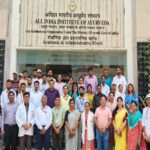New Delhi, July 12, 2018:
The World Health Organization (WHO) today called for the protection of health facilities and increased access to southern Syria, where the recent hostilities have left over 210 000 people displaced and in need of urgent health services. Up to 160 000 displaced Syrians currently seeking safety in Quneitra are inaccessible to health partners, raising concerns for their health.
“People in Dar’a and Quneitra are waiting for the humanitarian community to reach them with urgently needed aid and we cannot let them down. Access must be granted,” said Dr Michel Thieren, WHO’s Regional Emergencies Director. “We call on all parties to open the door to people in southern Syria and allow the safe delivery of medicines and medical items they need, and to grant severely injured patients safe passage to hospitals outside the area that can save their lives.”
The majority of people displaced are exposed to soaring summer temperatures of up to 45 degrees Celsius and dusty desert winds, with limited access to clean drinking-water, sanitation services, and adequate health care. In the past week, at least 15 Syrians – 12 children, 2 women, and one elderly man – have died due to dehydration, and diseases transmitted through contaminated water.
Almost 75% of all public hospitals and health centres in Dar’a and Quneitra are closed or only partially functioning, leaving injured people, including hundreds of innocent children, and pregnant women, in need of emergency obstetric services, with limited access to medical care. The WHO-supported blood bank was relocated after the health facility in which it was located was destroyed, and continues to function with minimum capacity.
Since the escalation of violence, WHO has provided medicines and supplies to health partners, hospitals, and primary health care centres for almost 200 000 medical treatments, including to facilities receiving critically injured patients. WHO is also supporting health service delivery in Dar’a, Jbab and other newly accessible areas through fixed and mobile health teams, which have provided more than 4500 consultations to date and screened more than 660 children for malnutrition. Vaccination activities are ongoing with the health authorities and partners.







